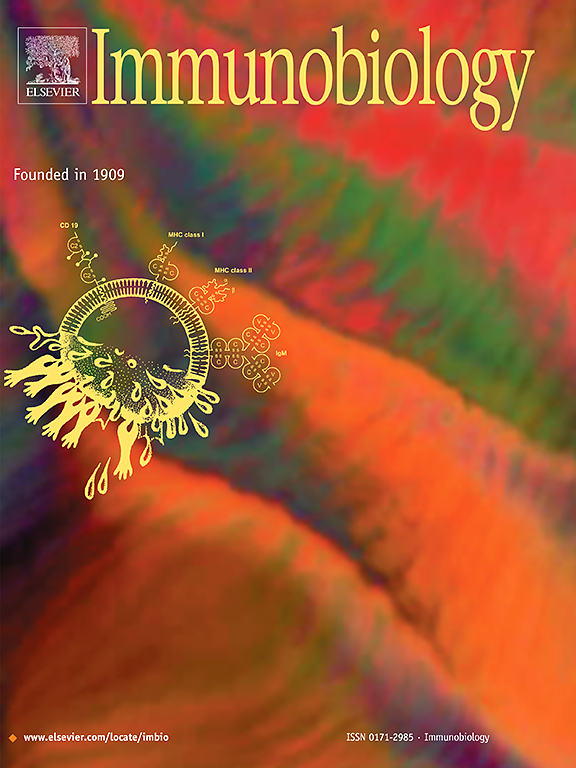Toll-like receptor upregulation in liver and peripheral blood mononuclear cells of patients with amoebic liver abscess
IF 2.3
4区 医学
Q3 IMMUNOLOGY
引用次数: 0
Abstract
Aim
We aimed to understand the host and microbe interactions at the time of infection and inflammatory response in amoebic liver abscess (ALA) patients based on toll-like receptor (TLR) expression (mRNA), cytokine and IgG subtypes levels.
Methods and results
Liver aspirates from 100 ALA patients and 11 liver autopsy samples were used as negative controls. Blood samples from 100 ALA and 41 healthy individuals were collected. mRNA expression of TLR 1 to 9 genes was measured using reverse transcriptase polymerase chain reaction (RT-PCR). Serum cytokines level was quantified by flow cytometry. In-house ELISA for the analysis of IgG and its subtypes in the serum samples was performed. A total of 7 TLR genes (TLR1, TLR2, TLR4, TLR6, TLR7, TLR8 and TLR9) and 6 TLR genes (TLR1, TLR2, TLR3, TLR4, TLR5 and TLR8) were found to be elevated in liver aspirates and PBMCs respectively. Increased serum cytokine levels were observed in ALA patients vs. healthy controls. Interestingly, a significant increase in IgG and its subtypes (IgG1, IgG3 and IgG4) was found in the serum of ALA patients.
Conclusion
Increased levels of TLR, pro- and anti-inflammatory cytokines, IgG and its subtypes, are possibly linked with early-stage infection in ALA patients.
Impact statement
The role of TLRs in association with ALA might provide insights into new therapeutic strategies.
阿米巴性肝脓肿患者肝脏和外周血单核细胞toll样受体上调
目的:基于toll样受体(TLR) mRNA表达、细胞因子和IgG亚型水平,了解阿米巴肝脓肿(ALA)患者感染时宿主与微生物的相互作用和炎症反应。方法与结果以100例ALA患者的吸银液和11例肝脏尸检标本为阴性对照。采集了100名ALA和41名健康人的血液样本。逆转录聚合酶链式反应(RT-PCR)检测tlr1 ~ 9基因mRNA表达量。用流式细胞术测定血清细胞因子水平。采用ELISA法分析血清样品中IgG及其亚型。共发现7个TLR基因(TLR1、TLR2、TLR4、TLR6、TLR7、TLR8和TLR9)和6个TLR基因(TLR1、TLR2、TLR3、TLR4、TLR5和TLR8)在肝抽吸液和PBMCs中分别升高。与健康对照相比,ALA患者血清细胞因子水平升高。有趣的是,ALA患者血清中IgG及其亚型(IgG1, IgG3和IgG4)显著升高。结论ALA患者TLR、促炎性和抗炎性细胞因子、IgG及其亚型水平升高可能与早期感染有关。影响声明tlr与ALA相关的作用可能为新的治疗策略提供见解。
本文章由计算机程序翻译,如有差异,请以英文原文为准。
求助全文
约1分钟内获得全文
求助全文
来源期刊

Immunobiology
医学-免疫学
CiteScore
5.00
自引率
3.60%
发文量
108
审稿时长
55 days
期刊介绍:
Immunobiology is a peer-reviewed journal that publishes highly innovative research approaches for a wide range of immunological subjects, including
• Innate Immunity,
• Adaptive Immunity,
• Complement Biology,
• Macrophage and Dendritic Cell Biology,
• Parasite Immunology,
• Tumour Immunology,
• Clinical Immunology,
• Immunogenetics,
• Immunotherapy and
• Immunopathology of infectious, allergic and autoimmune disease.
 求助内容:
求助内容: 应助结果提醒方式:
应助结果提醒方式:


